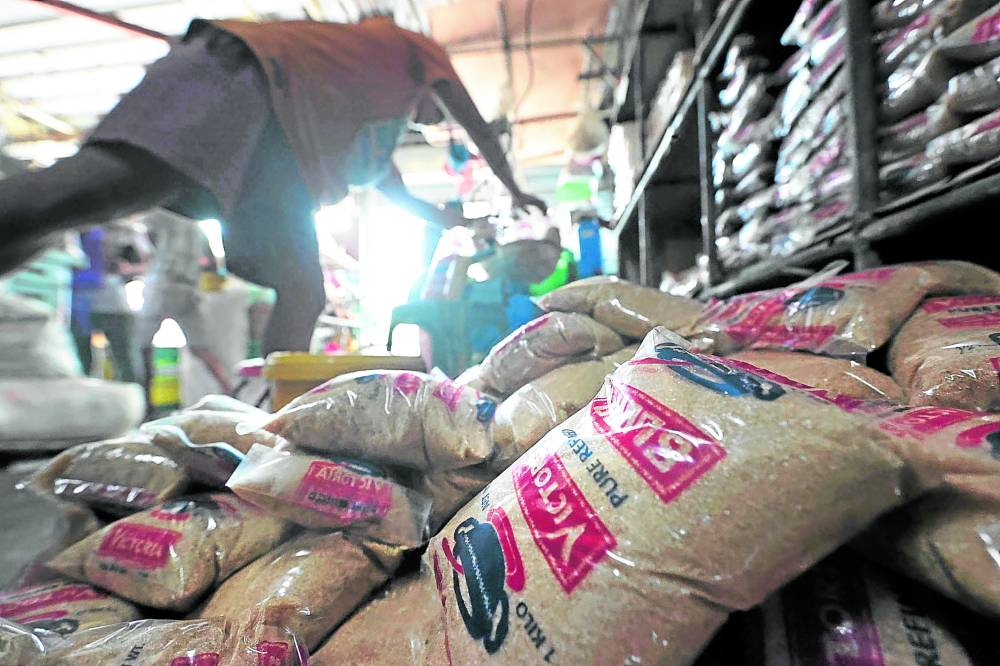Locally produced sugar still insufficient to meet demand, says SRA

A worker repacks sugar at a Visayas Avenue public market. The Philippines may allocate all its sugar for domestic consumption as local production remains insufficient to meet the demand.
—GRIG C. MONTEGRANDE
MANILA, Philippines – The Philippines may allocate all its sugar for domestic consumption as local production remains insufficient to meet the demand for this sweetener, the Sugar Regulatory Administration (SRA) said.
SRA Administrator Pablo Luis Azcona hinted that Sugar Order No. 1 for crop year 2024-2025 will classify all locally produced sugar as “B” sugar or domestic use.
SRA said domestic output is “never enough” as production in the previous crop year was 1.9 million metric tons (MT) yet demand is pegged at 2.3 million MT to 2.4 million MT.
Over the years, the SRA has set aside the entire sugar output for domestic use and relied on importation to plug any supply shortfall.
READ: Regulator mulls over sugar importation
Article continues after this advertisementThe last time the SRA made an allocation for the global market was for crop year 2020-2021 wherein 93 percent of sugar produced locally was set aside for the domestic market and the remaining 3 percent for the US market.
Article continues after this advertisementBut recently, the SRA gave local producers the go-signal to export 25,300 MT of raw sugar to the United States in fulfillment of the country’s export quota from Washington covering the fiscal year 2024.
Seeking to boost farmers’ income and production, the SRA is mulling over delaying the opening of the milling season to Sept. 15 from the initial schedule of Sept. 1.
SRA administrator Pablo Luis Azcona said several farmers’ groups approached him to adjust the beginning of the milling season by at least two weeks as some of the local producers are still recovering from the impact of the El Niño-induced dry spell which affected their harvests earlier.
In the Philippines, the crop year starts on Sept. 1 and ends on Aug. 31 of the following year.
The SRA said the plan is not yet final and is being discussed with industry stakeholders, adding it asked Philippine Sugar Millers Association Inc. to come up with a collective decision for the entire industry, especially farmers.
Speaking at the Philsutech Convention in Cebu City, Azcona said if the mills can get their acts together and agree to a two-week delay, it will be a win-win solution for the industry.
Azcona said while big planters can afford the delay, the small farmers might experience the difficulty of having their income delayed for even two weeks.
He said, “…and this is where the mills and the associations, including your SRA, can come into play by offering incentives, loans and more importantly, make them understand the higher yield which will translate to profit if everybody agrees to this.”
The SRA said two of the biggest mill operators Victorias Milling Co. Inc. and Universal Robina Corp. have “no objection” to this proposal.
It quoted URC managing director Renato Cabati in saying they “strongly agree” for all mills to start their operations together, at least in Negros Occidental where mills start ahead of everybody else in the country.
Furthermore, mills in Luzon informed the SRA of its intention to delay the opening of their mills by a month.
“Moreover, if most farmers are not willing to cut their canes prematurely, it will be a problem for the mills as they might have intermittent operations which will be costly in the long run. We need our mills to run efficiently and in full capacity,” he added.